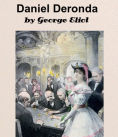George Eliot’s last novel is an ambitious undertaking. We follow two people starting with the moment they first saw each other, in 1865 at a resort in Leubronn, a fictional town in Germany. As young Gwendolyn Harleth plays roulette, she is observed by Daniel Deronda. She perceives that while he is taken by her great beauty, he seems to be critical of her behavior. Spoiled and stubborn, she refuses to stop until she has gambled away the last bit of her winnings, trying to appear uncaring. The next day she is called home by a letter from her mother that they have lost all their money, but not before the necklace she has pawned after her losses is mysteriously returned to her.
From there we go back to learn how the self-centered Gwendolyn and the quiet Deronda reached this moment. Gwendolyn has had everything her own way up to this point, ruling over her social circle despite her lack of wealth, uncaring about others, and demanding to be entertained constantly. Just before her trip to Leubronn with family friends, she has refused an offer from Henleigh Grandcourt, a man whose wealth and position would seem to promise all her dreams would come true. However, she has learned that he has a family already, with his longtime mistress.
Deronda is the ward of Sir Humphrey Mallinger, Grandcourt’s uncle. Like most people, he believes he must be Sir Humphrey’s illegitimate son. A most generous and compassionate man, he misses a scholarship to Cambridge through helping his friend Hans Meyrick to win one. He also rescues Mirah, a young Jewish girl who was about to drown herself, and takes her to the Meyrick family for safekeeping. Through her he meets a mysterious Jewish visionary named Mordecai and becomes interested in learning more about the Jewish faith. This novel is the first to treats Jews sympathetically.
From there the two stories continue in tandem, only occasionally intersecting. While there is a great deal of narrative, common in novels of the period, the tale is enlivened by Eliot’s light touch with dialogue and by her penetrating, and sometimes satiric, insight. For instance, she says “it was evident that Gwendolyn was not a general favourite with her own sex; there were not beginnings of intimacy between her and other girls, and in conversation they rather noticed what she said than spoke to her in free exchange.”
I love what Mrs. Meyrick says of her son: “‘If I were to live till my Hans got old, I should still see the boy in him. A mother’s love, I often say, is like a tree that has got all the wood in it, from the very first it made.’”
Deronda’s story of growing interest in Judaism and what we would now call Zionism is less interesting. In his introduction to my copy, F.R. Leavis disagrees with Henry James that Eliot’s intellectual ability is the cause; Leavis admires her intelligence and intellectual powers. Rather, he blames the failure of this part of the book on Eliot’s persistence in endowing her protagonists with idealism. He calls this “immaturity” on Eliot’s part, and even describes Deronda as being a woman in his desire to make the world a better place.
I disagree. As Donald Maass points out, “Generally speaking, we choose company that is pleasant.” He goes on to ask writers “What kind of person are you asking your readers to spend four-hundred or so pages with?” In another post he suggests that “Positive emotions are harder to access and more difficult to use. Perhaps that’s because they relieve conflict rather than feeding it.” Yet we as readers treasure our encounters with these emotions. “‘Higher emotions’ are called that for a reason. They elevate and inspire us. Even just reading about them changes us, as Thomas Jefferson once wrote and which more recently has been scientifically demonstrated in studies of ‘moral elevation’ by Dr. Jonathan Haidt and others.”
The trick is to make the character interesting by adding internal conflicts and shadings. He or she cannot be all positive. Plus the character has to change. While Deronda has some internal conflicts over who his parents are and whether the woman he loves will also love him, these do not fundamentally change him and he never does or is tempted to do anything wrong. The only way he changes in the book is through his decision to immerse himself in Judaism. He is still his perfect self at the end. Mordecai too is entirely perfect and does not change.
The other reason why the Jewish part of the story drags is that so much of it is presented in long intellectual monologues by Mordecai, unbroken by action or emotion. Today we call this “info-dumping” and try to avoid it.
I don’t think the problem here is idealism, so much as it is the lack of shading in our idealistic characters and the misuse of dialogue to convey chunks of information. Still, there is much to admire in this book. I found myself, despite having read it before, hurrying to get to the end to find out what would happen to these two characters.
Have you read any of George Eliot’s novels? What did you think of them?

I think I’ve read all of Eliot’s novels except the one in verse. I loved Daniel Deronda, but perhaps my favorite is Felix Holt.